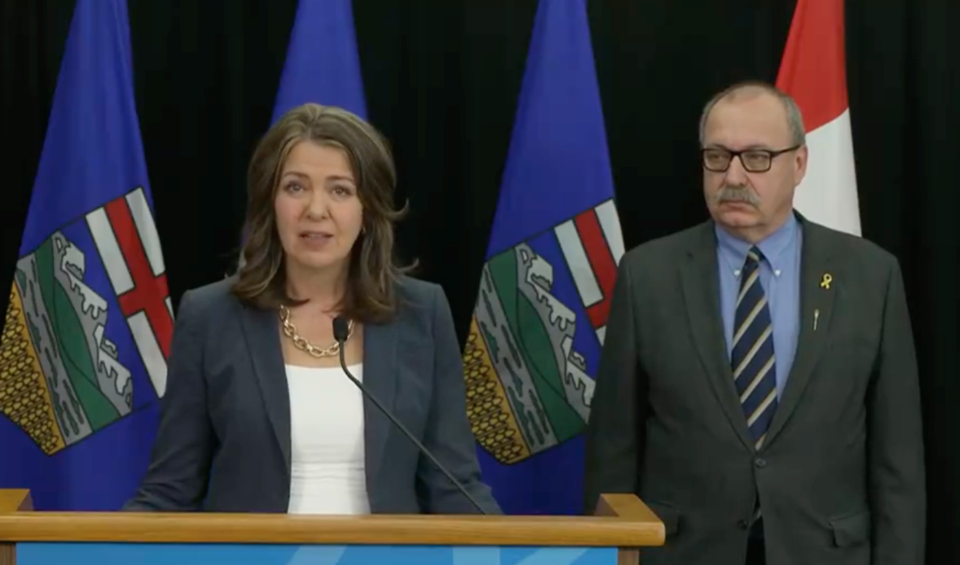Alberta’s government has introduced legislation requiring all federal funding agreements with provincial entities be approved by the province.
The province has hinted at the idea of legally preventing municipalities from directly making deals with the federal government, such as for housing or infrastructure funding, but the Provincial Priorities Act goes even further and extends to all “provincial entities.” Health authorities, public agencies, Crown-controlled organizations, post-secondary institutions, school boards, and housing management bodies, along with municipalities, are all subject to the act.
Premier Danielle Smith tabled the act in the legislature on Wednesday.
The premier said the legislation is another measure to defend the province’s jurisdiction.
“We are taking back more of our jurisdictional control and telling Prime Minister Justin Trudeau and his cabinet that they cannot make deals without our express approval,” Smith said at a press event on April 10.
Smith said the new legislation is needed to stop Ottawa from imposing a “destructive agenda on Alberta taxpayers.”
“We see this when they actively work around us to find funding agreements with municipalities and provincially regulated and funded organizations that run counter to Alberta's interests and priorities,” Smith said.
Smith said there are about 800 of 14,000 federal agreements her department has reviewed that have been “flagged as problematic,” naming electric buses, wind and solar projects, net-zero housing and electricity, safe supply programs, the national pharmacare plan, and dental care as the type of overreaching projects that run counter to Alberta’s priorities.
“What we really need is envelope funding to expand existing provincial programs that already exist in these areas,” she said.
Moving forward, all federal agreements with Alberta entities will go through the provincial government, to make sure there are no "ideological strings attached," and funds will then be disbursed to towns, cities, and other entities.
Municipal Affairs Minister Ric McIver said the act is not intended to be retroactive and won't interfere with existing federal-municipal agreements, "unless they have terms that can't be lived with," such as requiring homes be built without natural gas hookups.
Smith said the legislation is modelled on the Quebec law, Respecting the Ministère du conseil executif, which prohibits municipal bodies from making agreements with federal agencies unless they are authorized to do so by the Quebec government.
Alberta Municipalities (ABmunis) President Tyler Gandam said the new law will likely have a big impact on municipalities throughout the province, and he is disappointed the province didn't consult with municipalities before introducing the act.
"We represent 265 municipalities, 85 per cent of the population, when they introduce legislation like that, that could have a big impact on on funding that our municipalities see, I think it's imperative that have a voice in that," Gandam said.
Gandam said he has concerns about how the funding municipalities are getting will change and whether projects will be cancelled.
"What does this look like moving forward? How are we supposed to build relationships on the federal level, as well as the provincial level, when we're looking after a bulk of the infrastructure in our communities?"
Smith said now that they have developed the legislative framework, they will start consulting with the people it will impact, but that she doesn't expect municipalities should be surprised by the move from the province.
"This is the sort of process you go through from a government point of view. I believe that we’ve given very clear indication to all of the municipalities of the direction we were heading. I believe we’ve given very clear indication to Albertans of the direction we were heading," Smith said.
In Dececember 2023, Municipal Affairs asked municipalities to deliver a list of all agreements held with the federal government in the previous year, for everything from community mailboxes to RCMP office leases.
"I think a lot of us were waiting to see where it was going or why that information was requested. And again, we weren't consulted on it. So we would have no way to know that this was something that was even in the works," Gandam said.
"I think it's important for the provincial government to recognize that municipalities have unique needs, and funding is a big part of that. And our hope is that we don't create more of a barrier for municipalities to access federal funding when provincial funding is being cut or reduced," he said.
Since 2011, the amount of infrastructure funding municipalities receive from the province has fallen from about $420 per resident to about $186, according to ABmunis.
"We're seeing unprecedented growth in Alberta, it makes it that much more difficult for those cities or communities that are growing quickly to be able to afford to grow at the rate that we are," Gandam said.
Aside from shared infrastructure burdens, Gandam said municipalities have unique challenges that can benefit from having federal support. Gandam is also the mayor of Wetaskiwin, which he said deals with homelessness and social problems on par with major North American cities.
"I think it's important to have a relationship with and to be able to receive some federal funding through Ottawa, as opposed to us having to go through the province to to see the grants or the programmings coming through to our community. And I'm just I'm worried that it's going to create more red tape and limit access to funds," he said.



